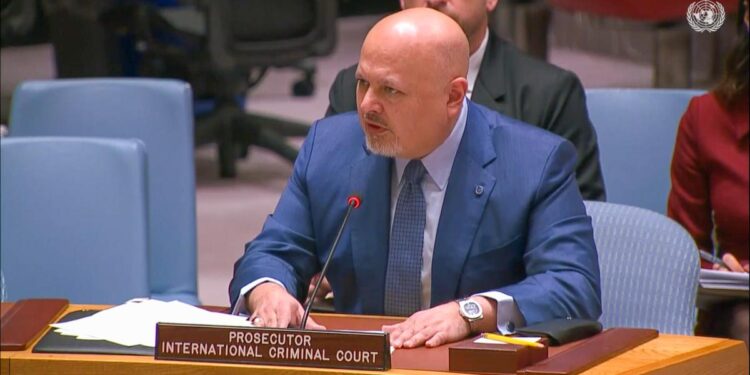Despite its offer of cooperation, Sudan has done little to aid the International Criminal Court’s quest to bring to justice the perpetrators of the Darfur atrocities, the Prosecutor has lamented.
Instead, the regime is trying to place administrative hurdles in the way of the court as it tries to carry out its investigation, Karim Khan told the United Nations Security Council (UNSC).
Delivering the ICC’s 36th report on Darfur to the UNSC on January 25, 2023, Khan described some of the obstacles as needing “Sisyphean efforts” to accomplish, for example even obtaining a single-entry visa.
The Prosecutor recalled that the memorandum of understanding signed with the Transitional Government of Sudan during his last visit to the country has not been honoured and cooperation has not improved since his last briefing to the council.
“My report attempts to fairly and accurately set out the unfortunate gap that exists between the words and the action of the Government of Sudan,” he said.
He said the hurdles include obtaining entry visas for ICC staff and earlier promises of multiple entry visas have not been delivered.
“Even when ICC staff have entered Sudan, they must wait for internal travel permits, including to go to Darfur. The court also has not received assistance with accessing public locations such as the National Archives, nor formal approval to establish an office in Khartoum,” Khan said.
Khan told the council that access to documentation and witnesses remains restricted and the Sudan government has not executed any request for assistance.
“More than 34 remain outstanding, and I continue to wait for formal approval for what was promised to me orally, what is in a signed memorandum of understanding, namely the ability for us to establish an office in Khartoum.”
He criticized those trying to frustrate accountability through non-cooperation, warning them of tough action should they continue to impede the process.
“And if we do not see a change of approach, I may have no option in the next report but maybe to commend certain other action by member states in the next period,” he said.
Matters seem to have markedly changed since August 2021, when the Prosecutor visited Khartoum and signed a memorandum of understanding for cooperation with the Transitional Government of Sudan with regard to the outstanding warrants of arrest that the ICC has issued since 2005, when the UNSC referred the situation in Darfur to the ICC.
“Sudan is not alone and my office is dedicated inshallah to the best of our ability to reach out and cooperate, and work with the Government of Sudan and her institutions,” the Prosecutor said in a press statement issued after the visit.
Khan remained optimistic of making progress in the country after a second visit in August 2022, during which he addressed the council from Khartoum, However, he expressed concern about what he termed “…a backward step has taken place in terms of cooperation in recent months”.
You May Also Like: Mokom’s confirmation of charges hearing put off
The Prosecutor asked the Sudan authorities to change their posture on cooperation as it is vital to meet the needs of the people of Darfur.
He lamented that no domestic trial has taken place in Sudan for the atrocities that led to the displacement of hundreds of thousands of people, the destruction of property, and the allegations of rape targeting children and civilians.
Commenting on the trial of Abd-Al-Rahman, also known as Ali Kushayb, who has been charged in connection with the crimes in Darfur, he said the case has made swift progress over the eight months since it opened, with over 70 sitting days, the testimony of 50 witnesses before the ICC, and the presentation of documentary evidence.
“These witnesses have had the opportunity to confront the accused; to have their accounts tested before independent, impartial judges, creating a record that will pave the way at the end of the process for a determination to be made on what took place and whether the accused is responsible,” he said.
The Darfur conflict began in 2003 when rebels protested what they contended was the Sudanese government’s disregard for the western region and its non-Arab population.
The government, under the leadership of President Omar al Bashir, responded by equipping and supporting Arab militias – which came to be known as the Janjaweed – to fight the insurrection in Darfur. The militias also terrorised civilians and prevented international aid organisations from delivering much-needed food and medical supplies to the region.
In 2005, the UNSC referred the situation in Darfur to the ICC, which is investigating allegations of genocide, war crimes, and crimes against humanity.
The United Nations says that about 300,000 people were killed and 2.5 million more displaced during the conflict that lasted until 2009.







